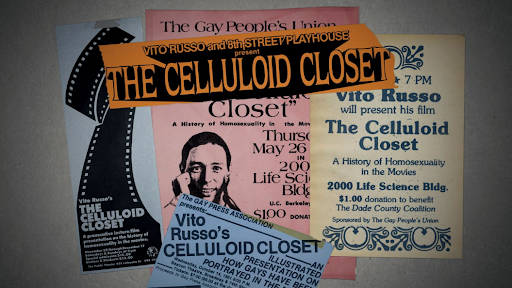‘The Celluloid Closet’, based on Vito Russo’s 1981 book of the same name, is an eye-opening documentary to watch.
The film, which was directed and written by Rob Epstein and Jeffery Friedman, was initially released in 1995. It talks about homosexuality in early Hollywood films, and how queer actors and directors have attempted to portray it despite severe censorship.
“In 100 years, homosexuality has only rarely been depicted on the screen, if it did appear it was there for something to laugh at, pity or even something to fear,” Russo explained.
In the early days of film, homosexuality was a forbidden subject to talk about or depict. However, movies were starting to be heavily censored in 1934. This is due in part to the Federation of Women’s Club, which pushed for the censorship of movies that didn’t depict things entirely socially and religiously moral. This included, but was not limited to, open-mouthed kissing, lustful embraxes, “sex perversion”, seduction, rape, abortion, prostitution, white slavery, nudity, obscentity and profanity.
“We hope that it will not be necessary to close all of the motion picture housing because of some of the ones that are not desirable, but that we have cleaner and better motion pictured so that they stay open,” Gustav Ketterer, a founding member of the Federation of Women’s Club, said in one speech about censorship.
Because of this, the older, vintage films that were shown throughout the documentary never spoke about homosexuality directly. The audience instead used clues from the character’s mannerisms to discover whether or not a character was gay, and see how they should be treated accordingly. Usually, they were not treated well. In the background of several interviews throughout the film, black and white films showed viewers how homosexuality was used as a joke.
This film also features a lot of actors talking about their experiences as LGBTQ+ people in Hollywood, showing how fictional depictions of homosexuality affected their real lives. Some of the actors that spoke with Epstein and Friendman included Whoopi Goldberg, Lily Tomlin, Quentin Crisp, Susie Bright and Richard Dyer.
The actors in the movie talked about watching certain films which featured coded gay characters as children. For people of the LGBTQ+ community who have a hard time finding other people like them, television and media are like their guide. But this was not enough for many of them. They were unable to be themselves, and if they acted like they wanted to, they were put into a box of isolation from the outside society. The films shown throughout ‘The Celluloid Closet’ influenced kids who were homosexual how to act, and rarely served as good models.
“Your ideas about who you are don’t just come from inside you, they come from the culture- and from this culture, it comes from the movies,” said actor Richard Dyer.
Before watching the film, I didn’t know it was a documentary. ‘The Celluloid Closet’ made me realize how hard it had to been to be a homosexual or queer actor before the 2000s. Even now, some celebrities find it hard to come out as LGBTQ+. Homosexual actors should not have to hide who they are and should have an avenue to express themselves on film.


























